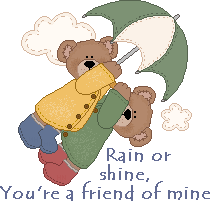Here are some suggestions of things you can do or say if your friend of family member self harms:
- Encourage the self harmer to get some professional help.
 Talk to your loved one about seeing a therapists or counsellor. You could mention that you've noticed that they seem unhappy. Point out that it's ok to need outside help. I know that I would have been very uncomfortable if my parents had talked to me directly about self harm - but if they'd talked to me in general about seeing a professional I would have been more willing to listen. When chosing a therapist, be sure to ask them about their experience with self harm and what is their treatment approach.
Talk to your loved one about seeing a therapists or counsellor. You could mention that you've noticed that they seem unhappy. Point out that it's ok to need outside help. I know that I would have been very uncomfortable if my parents had talked to me directly about self harm - but if they'd talked to me in general about seeing a professional I would have been more willing to listen. When chosing a therapist, be sure to ask them about their experience with self harm and what is their treatment approach.
- Do some research into self harm.
Read some books on the subject. I recommend 'The Scarred Soul' by Tracy Alderman. Your local library may have a copy. I also recommend the links here.
- Tell them that you love them & want to help.
Self harmers often feel very unlovable. At times I felt like a really bad person & it was hard to accept that anyone cared about me. It's really important that your loved one knows that you love them and you don't judge them negatively because of their self harm.
- Get some support for yourself.
Don't forget to look after yourself and your own feelings. You may be shocked, upset or angry. You can talk to other people in similar situations to you on the BUS Web Board for Families & Friends.
- If your loved one wants to talk, then listen.
It's also helpful if you ask questions. That way your loved one knows that you're interested. Some examples of good questions to ask are given in Tracy Alderman's book, 'The Scarred Soul':
- How long have you been hurting yourself?
- Why do you hurt yourself?
- How do you hurt yourself?
- When and where do you usually injure yourself?
- How often do you injure yourself?
- How did you learn to hurt yourself?
- What is it like for you to talk to me about hurting yourself?
- Does it hurt when you injure yourself?
- How open are you about your self-injuruious behaviour?
- Do you want to change your self harming behaviour? (Do you want to stop self harming?)
- How can I help you with your self harm?
Be aware that it's often very difficult for self harmers to talk about their feelings & behaviour - I still have a hard time being open with my husband about self harm. If your loved one doesn't feel ok about answering these questions then don't push the issue - give them some time. You also probably won't cover all these things in one discussion.
- Set some clear guidelines about when you can and cannot be available for support.
You have to balance your well being with your loved ones needs. It's important to listen to how they are feeling and be supportive, but it can become overwhelming. It will be best for everyone if you make your limitations clear from the beginning. When is it ok for your loved one to phone you? Let them know if there are times when you will be unavailable. Perhaps they like to talk late at night, but you are too exhausted after a long day's work. By making clear boundaries your loved one won't feel let down or rejected at a vulnerable moment.
You can use these safe coupons to let your loved one know when & how you can be available to them. There are blank spaces to add your contact details and the times that you will be available.
- Let your loved one know that their feelings are valid & important.
Self harmers often have a hard time believing what they feel. They often think their feelings are "wrong" or "bad". I used to believe that I had "no right to be depressed". But feelings are not right or wrong - they're how someone feels. Don't ever tell someone how they feel or that they should not feel how they do. If a loved one tells you how they are feeling, then let them know that their feelings are valid.
- If you have a teenage friend who self harms, encourage them to talk to a school counsellor, doctor or trusted adult.
If you feel that your friend is in serious danger (they're suicidal, are overdosing, are self harming severely) and they won't get help, then please talk to someone. (A teacher, counsellor, other adult - parents are often part of the problem so it may not be the best choice to tell them without your friend's permission.) Your friend may be mad at you for a while but it's likely that they will thank you in the future.

